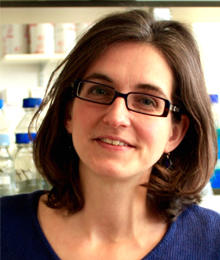An interview with Dr Stineke van Houte
October 2020
Dr Stineke van Houte is a Biotechnology and Biological Sciences Research Council (BBSRC) Future Leader Fellow and is based at the Environment and Sustainability Institute at the University of Exeter. She is also a member of the Microbiology Society. In this interview, she tells us more about her research into CRISPR-Cas immune systems in bacteria, why her research is important and why microbiology matters.

Tell us more about your role and area of research.
I am a Senior Research Fellow in microbiology at the University of Exeter. I currently run a group of six people, with whom I work on interactions between bacteria and mobile genetic elements (MGEs), such as bacteriophages and plasmids. A fairly large part of our research is centred around CRISPR-Cas immune systems in bacteria and establishing how important these systems are for bacteria, in defence against MGE infections. We also study how MGEs avoid CRISPR-Cas immunity and how we can use CRISPR-Cas as a tool to selectively remove certain genes of interest, such as antibiotic resistance genes, from a microbial community; .
Over the past few years we’ve studied how some Pseudomonas aeruginosa phages can make use of so-called anti-CRISPRs to avoid CRISPR-Cas immunity, and we’re combining a range of experimental approaches – experimental evolution, biochemistry, mathematical modelling and microscopy – to tackle such questions, which allows us to get a much deeper understanding of what is happening, compared to using a single approach.
We also investigate how we can use mobile CRISPR-Cas systems to target antibiotic resistance genes in a microbial community; and together with collaborators, in multidrug-resistant clinical pathogens of E. coli, Klebsiella pneumoniae and Enterococcus faecium. Although this line of research has a clear applied aspect to it, as we go along there is a lot of fundamental knowledge, we can gain about interactions between MGEs and their hosts, which is of course the beauty of science! Finally, we work on finding new bacteriophages that we could potentially use as an alternative to antibiotics.
Why is your research important?
Antimicrobial resistance is a major problem that our world is currently facing – I hope our research is a small step forward in our quest to find alternatives to antibiotics, whether that’s through the use of bacteriophages, or by developing completely new technologies to reduce the burden of antibiotic resistance.
Why is it important to be a member of an organisation like the Microbiology Society?
The Microbiology Society is doing a tremendous job in bringing microbiologists of all career stages together. I’ve taken many opportunities myself thanks to the Society, (e.g. I have presented my research as a postdoc), and various people in my lab have received travel grants from the Society, which have allowed them to participate and present their work at the Annual Conference. I’m really happy to be part of such a thriving community and I think the future looks bright for the Society.
Why does microbiology matter?
Because microbiology is about all of us and around all of us! It’s a vital part of all our ecosystems, our bodies, our daily food… how could it not matter?


